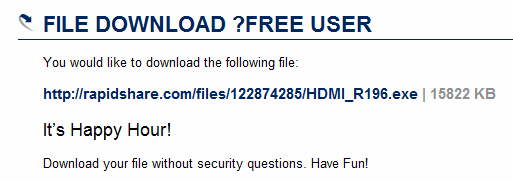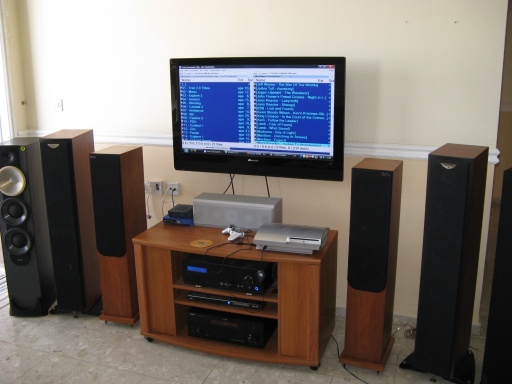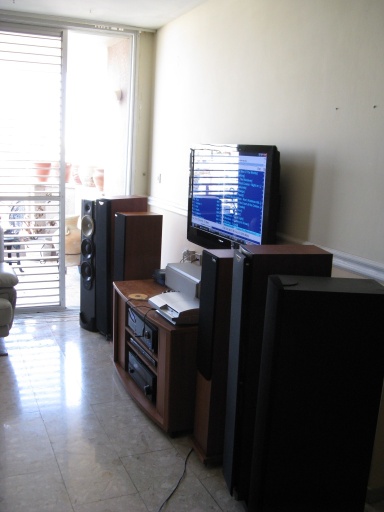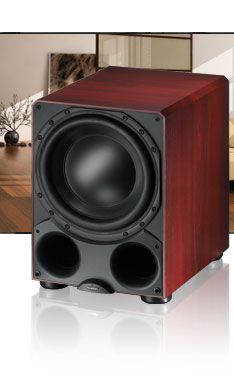Update (11 March 2009): Microsoft has retired FolderShare in favor of Windows Live Sync. It’s basically the same service, except they’ve significantly increased the file limit per library and finally added full Unicode support. Now that my two major gripes with the service are resolved I’m perfectly happy with Sync, and it’s free to boot! I have a very large collection of music files, easily 70GB with thousands of files (those lossless rips can be quite space-consuming). I listen to music both at home and at work, and don't want to go through the trouble of synchronizing these collections manually. In fact, I would like a service that fulfills the following requirements: - Easy to set up;
- Works across NAT, preferably with UPnP support;
- Full Unicode support;
- No artificial limit on library size;
- Not required, but definitely advantageous:
- Free;
- Low memory and CPU overhead;
- Libraries are accessible over the web;
- Some sort of online backup solution
The NAT support is an absolute must, as I have little or no control over the firewall at work. Unicode support may sound like a trivial requirement, but as you'll see most solutions do not properly support Unicode. My collection contains albums in multiple languages, including Hebrew, Japanese and Norsk, but even English albums can cause issues (Blue Öyster Cult, for example). I've tested the following solutions:
Microsoft FolderShare (now Windows Live Sync, see update above) Although this is one of the oldest players in the game (the company was bought out by Microsoft in 2005) it hasn't seen any visible improvement in a very long time. Despite the apparent dormant development, the service itself works well and is very consistent and reliable. What separates FolderShare from any other solution I've tested is a very user-centric design: any reasonably literate computer user (read: knows what files are and can double-click on an install button) should be able to set up a FolderShare account and start synchronizing files literally in minutes. Once set up the service simply works; other than the disadvantages which I'll enumerate momentarily, I've had absolutely zero problems with the service in over a year of use (well, to be honest there was a highly-publicized two-week service outtage over a year ago, but it's been hassle-free before and since). FolderShare fails in two specific ways: it's limited to 10,000 files per library (I think there's a limit on the number of libraries supported, but I've never come close to it), and it does not properly support Unicode. This means that files with characters outside the ANSI character set and machine codepage simply do not get synchronized. Other than that its interface is amazingly limited with very few customizable options, but in my opinion this isn't really an issue because the software simply does its job really well. With these disadvantages in mind, I wouldn't hesitate to recommend FolderShare to English speakers (or ones that do not make use of non-Latin file names), but the rest of us will have to look elsewhere. With Unicode support I'd definitely go back to FolderShare though, it's an excellent product. PowerFolder Touted as an open-source file synchronization solution, PowerFolder utterly failed to impress me; it appears to be a very powerful solution, but consequently suffers from a very cluttered UI that's hard to grok. I wouldn't recommend this service to casual users, and it wasn't trivial for me (as a software developer) to figure out either. I installed a trial version of PowerFolder Pro on both machines, but once I got past the strange UI idioms I just couldn't get the software to work reliably. I managed to send an invitation from one machine to the next (synchronized directories in PowerFolder do not appear to be centrally managed), but couldn't figure out how to get them to sync reliably nor how to resolve file conflicts. Finally, the client software is a real memory hog. BeInSync Fairly similar to PowerFolder (with additional online backup features on Amazon's S3 storage service), BeInSync is a commercial product that appears to provide all of the features I require. The service was fairly easy to set up, although not nearly as streamlined as FolderShare. I got my directories to synchronize properly and was relieved to find that Unicode is fully supported by this product. Despite the promising start, my experience with this product was far from satisfactory: the client UI is incredibly slow and non-responsive. Other than general slowness in rendering speed and bizarre UI idioms (for example, the only way to get a reasonable status display is via the View menu), resolving synchronization conflicts can easily take 30 seconds per file with no batching capabilities at all. On top of that the client software is a major resource hog, easily taking up 60MB and more resident memory, and for a reason I couldn't figure out I could see 3-9MB per second I/O activity from the client although it exhibits no synchronization activity. To add insult to injury, the uninstall program requested that I restart my computer - nitpicking, I know, but what the hell? Having tested three different services I'm sorely tempted to go back to FolderShare and figure our a manual synchronization scheme for the Unicode files. The other alternative is a homebrew VPN+robocopy/rsync/SyncToy solution which I'd prefer to avoid. I'm rather surprised that it's so hard to find hassle-free synchronization services so late in the game...
Apparently Vorbis (.ogg) files are not all that commonplace, and some popular web servers (at least IIS7) aren't configured to handle them by default. Under the assumption that it's a case of missing MIME type I send a support request to GoDaddy (my web host of choice), who were pleasantly responsive and even helpful. IIS 7.x supports configuration of mime-types on the application or virtual directory level by including the following lines in a Web.config file at the root of said directory: <system.webServer>
<staticContent>
<mimeMap fileExtension=".ogg" mimeType="audio/ogg" />
</staticContent>
</system.webServer>
After making the change, all .ogg file links within this site are now accessible (this particularly pertains to the Defender of the Crown links).
This guy hooked up an old Sinclair ZX Spectrum to a bunch of crappy hardware (a hard drive array, an old dot matrix printer and a scanner) and got them to play an amusing (though still impressive) approximation of Radio Head's "Nude". Here's to a bigger geek than I can ever hope to be! 
Because the Java language lacks delegates, anonymous classes are prevalent as a syntactic replacement. Non-static nested classes are also often used in the language, a feature which is conspicuously absent from C#, albeit far less necessary with that language. This brings me to the following language caveat. This may seem a contrived example, but it's a simplification of an actual issue I've encountered in the last few days. Suppose you have a generic base class, call it BaseClass<U>, which you extend with an anonymous class. Lets also assume that the extended class spawns a thread that needs to access the BaseClass<U> state: class BaseClass<U> {
void getState() {}
}
class Test {
public void test() {
final BaseClass<String> instance = new BaseClass<String>() {
public void invokeStatefulThread() {
// Create our runnable
final Runnable threadCode = new Runnable() {
public void run() {
/* 1 */ getState();
/* 2 */ this.getState();
/* 3 */ super.getState();
/* 4 */ BaseClass.this.getState();
/* 5 */ BaseClass<String>.this.getState();
}
};
new Thread( threadCode ).start();
}
};
instance.invokeStatefulThread();
}
}
I'll spare you the guessing game. Here's what happens with each of the five invocations of getState():
- Compiles and behaves as expected.
- Obviously won't compile; this points to the Runnable.
- Obviously won't compile; the superclass of a Runnable is Object.
- Although this is the correct raw class, it won't compile because "No enclosing instance of the type BaseClass<U> is accessible in scope", even though the raw type should still be accessible and U can be inferred.
- Although this appears to be the correct fully-qualified form, this does not compile with a "Syntax error on token(s), misplaced construct(s)" error.
The Java language specification section on "qualified this" is very brief and does not mention generics at all (does "class name" include bounded type parameters?). Oddly enough, moving the class declaration outside of the test method actually lets 4 compile -- if there's a clue there, I haven't figured it out yet.
I still haven't found a syntactically-correct way to access BaseClass<string>.this, other than placing it in a temporary variable outside of the Runnable declaration. I searched yesterday for a couple of hours with no obvious solution in sight. Ideas are more than welcome!...
In addition to the wide press coverage on US-oriented technology sites we've seen coverage from two major Israeli news providers (Hebrew only, for now): Calcalist and TheMarker. Now comes the fun part; Delver is still borderline-alpha. We've been working hard testing and tweaking it, and getting a system of this complexity working in good order on a ridiculously short schedule feels astounding. I sincerely believe the Delver premise is a solid one, and we're giving you a mere inkling of what's in store for the concept; now all we have to do is work harder, growing along with the product and slowly but surely realizing its full potential. The brilliant part? Beyond the dreams of rich and fame, this product already is useful; with relentless improvements it may yet become as indispensable a tool to Internet denizens as Google, Wikipedia and Facebook are today.
An alpha version of our search engine is now open for all users! 
We've been working towards this day for the past year, building a complete and functional search engine from scratch on a completely original premise. I'm both amazed and proud of the work done by the various teams, and I'm still can't believe we've managed to pull this off in so little time. Launching the search engine publicly seems like a great way to celebrate the year I've been working for Delver (as of July 1st). Mind you, the service is still new and we're hammering away at the kinks, but so far we've had overwhelmingly positive press coverage and the various comments are sincerely flattering. Here's to another amazing year! As an aside, we're got openings on my team (search back-end) for extremely talented software developers who are interested in building performance-driven, robust back-end software in a variety of technologies. Interested? Contact me for details at tomer@delver.com!
After figuring out the problem with the old dasBlog permalinks I had to figure out a way to convert all existing links in my blog to the new format. Lately whenever I need a script I try and take the opportunity to learn a bit of Python, so it took an hour or two to write the conversion script. Here it is; if you want to use this for your own copy of dasBlog, change the "domain" global variable to wherever your blog is located and run this from your ~/Content directory (you can also download the script here): #!/usr/local/bin/python
#
# convert_permalinks.py
# Quick and dirty permalink converter for dasBlog content files
#
# Tomer Gabel, 22 June 2008
# http://www.tomergabel.com
#
# This code is placed in the public domain (see http://creativecommons.org/licenses/publicdomain/)
from __future__ import with_statement
import os
import glob
import re
import urllib
# Static constants
domain = 'tomergabel.com'
href_lookup = re.compile( 'href="(http:\/\/(www\.)?' + re.escape( domain ) + '/[^"]*\+[^"]*?)"' )
# Globals
conversion_map = {}
# Takes a URL and removes all offensive characters. Tests the new URL for validity (anything other than a 404 error is considered valid).
# Returns a tuple with the converted URL and a boolean flag indicating whether the converted URL is valid or not.
def convert( url ):
new_url = url.replace( "+", "" )
# Check URL validity
valid = True
try:
resp = urllib.urlopen( new_url )
resp.close()
except:
valid = False
return [ new_url, valid ]
# Processes the source file, converts all URLs therein and writes it to the target file.
def process( source_file, target_file ):
with open( source_file, "r" ) as input:
source_text = input.read()
conv_text = source_text
match_found = False
for matcher in href_lookup.finditer( source_text ):
if ( matcher != None ):
match_found = True
original_url = matcher.group( 1 )
print "\tConverting permalink " + original_url
if not conversion_map.has_key( original_url ):
conversion_map[ original_url ] = convert( original_url )
conversion = conversion_map[ original_url ]
if conversion[ 1 ]:
print "\tConversion successful, new URL: " + conversion[ 0 ]
conv_text = conv_text.replace( original_url, conversion[ 0 ] )
else:
print "\tConversion failed!"
# Write out the target file
if match_found:
with open( target_file, "w" ) as output:
output.write( conv_text )
# Entry point
for file_name in glob.iglob( "*.xml" ):
print "Processing " + file_name
process( file_name, file_name + ".conv" )
What a stroke of luck! With more and more sites foregoing captchas, I was starting to think weird-ass captchas are a thing of the past. Fortunately trusty old RapidShare brought me to task: 
Apparently not only am I meant to figure out the convoluted glyphs (it took me a while to figure out that there are no numbers -- their G looks exactly like a 6, O and 0 look the same etc.), but I'm supposed to match only the letters connected to a cat. Conceptually amusing, but what the hell? Can you tell me which of the above are cats? Is it reasonable to expect someone to spend more than about 5 seconds on a captcha? Oddly enough I re-entered the link a little while later to discover the amazing RapidShare feature called "Happy Hour": 
And I'm just left scratching my head.
Update (22 June 2008): I've posted a Python script for converting the invalid permalinks to their "proper" form. After moving to GoDaddy I found to my chagrin that none of the site's article links (a.k.a permalinks) seem to work. There are any number of reasons why this is a bad thing, the two primary reasons being that Google cannot crawl the actual articles and that historical, incoming links no longer work. As they say, crap on a stick. I originally looked into the URL rewriting rules and HTTP handler configuration in web.config, thinking that perhaps some of the handlers need to be manually registered with IIS for some reason; eventually I installed the blog locally, migrated to IIS pipeline mode (which might be cool but has no tangible benefit for me) but the problems persisted. Until I tried accessing a permalink URL locally, that is. Then I discovered that plus signs in URLs (dasBlog's way of avoiding encoding spaces to %20) are considered "double-encoded" characters, and are automatically rejected by IIS 7.0 by default because under some circumstances they pose a security threat. There's a knowledge-base article detailing how to resolve this on a server or per-application level, but either solution requires server reconfiguration. Working under the assumption that this entails special requests from each and every potential future web host, and that having plus signs in my URLs is not the "right thing to do" anyway, I just opted to disable them and try to rework the existing links as best I can. I suppose blogs with considerably higher traffic cannot afford that luxury, but then blogs with considerably higher traffic usually work with much more specialized hosting providers and wouldn't have to worry about server reconfiguration in the first place... Anyway, hope this helps someone.
Note: This is a translation of a forum post in an Israeli home theater site. If you're Hebrew-enabled, the ensuing thread might be of interest to you. After a long period of running around, testing and making arrangements I've finally bought a new set of speakers for my home theater setup. I intend to describe the process, so if you're impatient feel free to scroll to the conclusion. I've used the same set of CDs, same amplifier and same testing methodology for each system I was demonstrated: - A Yamaha RX-V3800 A/V receiver, hooked up with HDMI where available and regular optical cable where it wasn't
- I started each demonstration with a consistent set of musical segments, with the receiver set to Pure Direct mode. Specifically:
- Telegraph Road (out of Love Over Gold by Dire Straits)
- Converting Vegetarians (out of the album by the same name)
- Elation Station (same album)
- Sharp switch to Creedence Clearwater Revival, with Lookin' Out My Backdoor
- Followed by Heard It Through the Grapevine by the same band
- Another sharp switch to Ear Parcel (out of Fear of Fours by Lamb. It's kind of "busy acid jazz" -- recommended for giving amplifiers a serious run for their money)
- And ending with Telegraph Road, again out of the Dire Straits album Love Over Gold
- In some cases I also played excerpts of Time and The Great Gig in the Sky by Pink Floyd
- I then proceeded to the home theater tests:
- Master and Commander: The Far Side of the World (the first naval warfare scene, as well as the scene where the captain and doctor play music together)
- I Am Legend on BluRay (Dolby TrueHD, mostly the chase scenes)
- Pan's Labyrinth on BluRay (DTS HD Master Audio, mostly dialogue-oriented scenes)
- Harry Potter and the Order of the Phoenix (several segments, the O.W.L test scene in particular)
- Gladiator (opening scene)
- After hearing all available options I've narrowed the selection down to three main (front) speakers and borrowed them for testing at home.
- The prices mentioned are from memory, in New Israeli Shekels and can be considered MSRP. In other words, you can usually get the same goods for a considerably lower price. Additionally, Israeli customs have a ~30% tax (VAT included) on loudspeakers, so prices here aren't really representative of the market price in the US.
The setups I've tested were: Klipsch This system is particularly characterized by a "large" sound-stage, and seems to be designed mostly for home theater use. Compared to most other systems I've listened to, the Klipsch speakers exhibit full and punchy sound in home theater, but which sounds slightly anemic when listening to music (the sound produced lacks volume - particularly noticeable with Dire Straits) and lacks resolution. The center, however, exhibited great potential in dialogues (Pan's Labyrinth in particular); the next center speaker high up in Klipsch's product offerings is the RC-64, which sounds even more impressive and is one of my candidates for purchase.
Bottom line: a good choice for those interested specifically in home theater, but Paradigm's more impressive offerings are available in the same price range in Israel.
Total cost: approximately 24,000 NIS. Focal, Chorus series - Front: Focal 816V
- Center: Focal 800CC
- No surround back
- No subwoofer
In a word: disappointing. I didn't even bother to continue with the home theater benchmarks. I had high hopes for this setup, both because of recommendations by several forum members in various conversations and because I have a Focal component set in my car and was pleasantly surprised by their performance in that market segment. With this setup, however, the result was a "dirty" sound that lacks proper resolution, is sharply biased towards low bass and over-bright treble. I consider this by far the weakest setup I have tested in my search.
Cost of the front speakers: about 8,000 NIS. Update: Forum members have pointed out that the actual price may be closer to 12,000 NIS. Triangle, Esprit EX series These speakers exhibit a very French sound, open and airy with terrific mid-bass and no shortage of punch in the low-end. The Antal were some of the most impressive speakers I've examined (in price as well as performance) and I ended up borrowing them for testing at home. The center speaker had terrific resolution and a very pleasant sound, despite the fact that the particular speaker tested was new and not yet broken in.
Cost of the front speakers: About 11,000 NIS. ProAc - Front: ProAc Studio 140
- Center: Focal Chorus 800CC
- Surround back: Focal Electra 1007 Be (I think)
- Subwoofer: B&W ASW608
I am not really partial to British loudspeakers in general, and ProAc in particular; I had previously listened extensively to both Tablette Signature and Response One models and had disliked their tonal character, which in my opinion is overly analytical and dry. This is why I entered this particular demonstration with rather low expectations, but the Studio 140 speakers simply blew me away from the get-go: they combine astonishing detail and resolution with huge sound-stage, and provide low, tight bass that's way out of their size league. At an MSRP of 15,900 NIS (actual price considerably lower) they are 30-40% more expensive than my other favorites.
The rear speakers also impressed me, particularly with the ambient effects in Master and Commander, but I think they are from a very highly priced series in Focal's line. Paradigm, Monitor series I'll admit that I came to this particular demonstration positively biased; I've known the old Monitor 9 v2 model for years and very much like the sound character of Paradigm's products. This system is one of the finest I've heard: the Monitors dealt incredibly well with just about any music I could throw at them and produce a deep, wide sound that I find very attractive. In the home theater benchmarks this setup absolutely shined: the Monitors themselves produce deep, penetrating bass and overall sound that is far tighter and more detailed than the Klipsch RF-82s. The center speaker is very convincing in dialogues, but lacks in the bass department, which is why I'm hoping to test the CC-390 and add it to my list of candidates for purchase. Regardless, I ended up borrowed the Monitor 11 pair for testing at home.
The subwoofer deserves a separate discussion which I get to further down the page.
Total cost: about 20,000 NIS, making this an amazing value for the money. Paradigm, Studio series Since the previous system left me some room in my budget I've allowed myself to test two of Paradigm's much-vaunted Studio series loudspeakers. The Studio 60 failed to impress me despite their impressive detail and resolution, this due to lacking mid-bass and low-end; I moved on quickly to comparing the Studio 100s directly with the Monitor 11. This model was far more to my liking: clarity and high resolution combined with tight, bunchy bass, but the sound still felt too thin and lacking in authority compared to the Monitor 11. To those of you looking for a highly detailed, analytical loudspeaker I definitely recommend giving the Studio 100 speakers a listen, but they just don't match my own preferences.
Cost of the Studio 100: roughly 16,000 NIS. Finally I've heard several front and center speakers that I did not mention (certain Canton and Wharfedale models, for instance) because in my opinion they are not in the same league as those products. I will not bother expanding on those. 
Eventually I've reached the dilemma of choosing between Triangle Antal EX (a beautiful loudspeaker with a deep, warm tonal character), Paradigm Monitor 11 (an impressive loudspeaker with serious presence, nor is it shy playing just stereo) and the considerably more expensive ProAc Studio 140. I was given all three pairs for testing at home during the Shavuot holiday, which gave me a relatively long time to spend with each speaker. I had four days to experience a variety of music, movies and TV series in a wide variety of genres, and have managed to reach several conclusions about these speakers: - First and foremost it's worth noting that each and every pair sounded simply magnificent. I felt privileged to be able to simply switch from one pair to another and experience their magnificent respective sounds.
- I don't care what other people say, the Antal EX speaker is simply gorgeous.
- For all you married people: my SO actually preferred the looks of the Monitor 11.
- The Antal and Monitor speakers have similar character to their sound; where the Antal set was more detailed the Monitors compensated with glorious mid-bass, and where the Antals exhibited great low-end muscle the Monitors shined with excellent high-end resolution. If I had to pick between the two I'd be facing a bothersome dilemma, however...
- The Studio 140 set simply offers the best of all worlds and was the clear winner in my mind. Accurate and detailed yet exhibiting an amazingly wide sound-stage with deep, low, tight bass to boot? Not only that, the rich mid-bass and pleasant overall tone completely eradicated my expectations of dryness. They are indeed quite a bit more expensive, but I think they completely justify the price delta (5,000 NIS on paper, probably less in practice).

Bottom line: a pair of ProAc Studio 140 speakers will soon find its new home in my apartment. As an unexpected bonus I was also provided the Paradigm DSP-3400 subwoofer for testing at home. When the sub was initially demonstrated for me at Stereo-Star, Rami (the sales person who was conducting the demonstration) walked in the room with a gargantuan cardboard box, and with a smile on his face told me "not to get excited, the sub is smaller than the box." Although technically true, the statement hadn't prepared me for just how amazingly big this subwoofer is -- a 14" woofer with two 6" ports underneath: 
This subwoofer was my companion for the holidays and indirectly thought me a couple of tricks on how to reinforce cupboard hinges. I'm fairly a bass aficionado, particularly when it comes to home theater, and this little monster went above and beyond my expectations. After returning the demo model I went to a short demonstration of another subwoofer, the B&W ASW610, a little monster in its own right; the problem was that compared to the gut-wrenching effect produced when the DSP-3400 comes to life this was simply an underwhelming experience. Conclusion 1: I should sample equipment in order of ascending cost, not the other way around. Conclusion 2: I'm buying the DSP-3400. Its MSRP: about 7,500 NIS. The demonstrations were held courtesy of Yaki of Z-Max, Rami Kasher of Stereo-Star, Zohar of Armageddon Audio and Eyal Por of Audio Fidelity. I heartily recommend to anyone looking for similar equipment to contact them. And for those of you with me so far, here's a bonus kitty: 
|